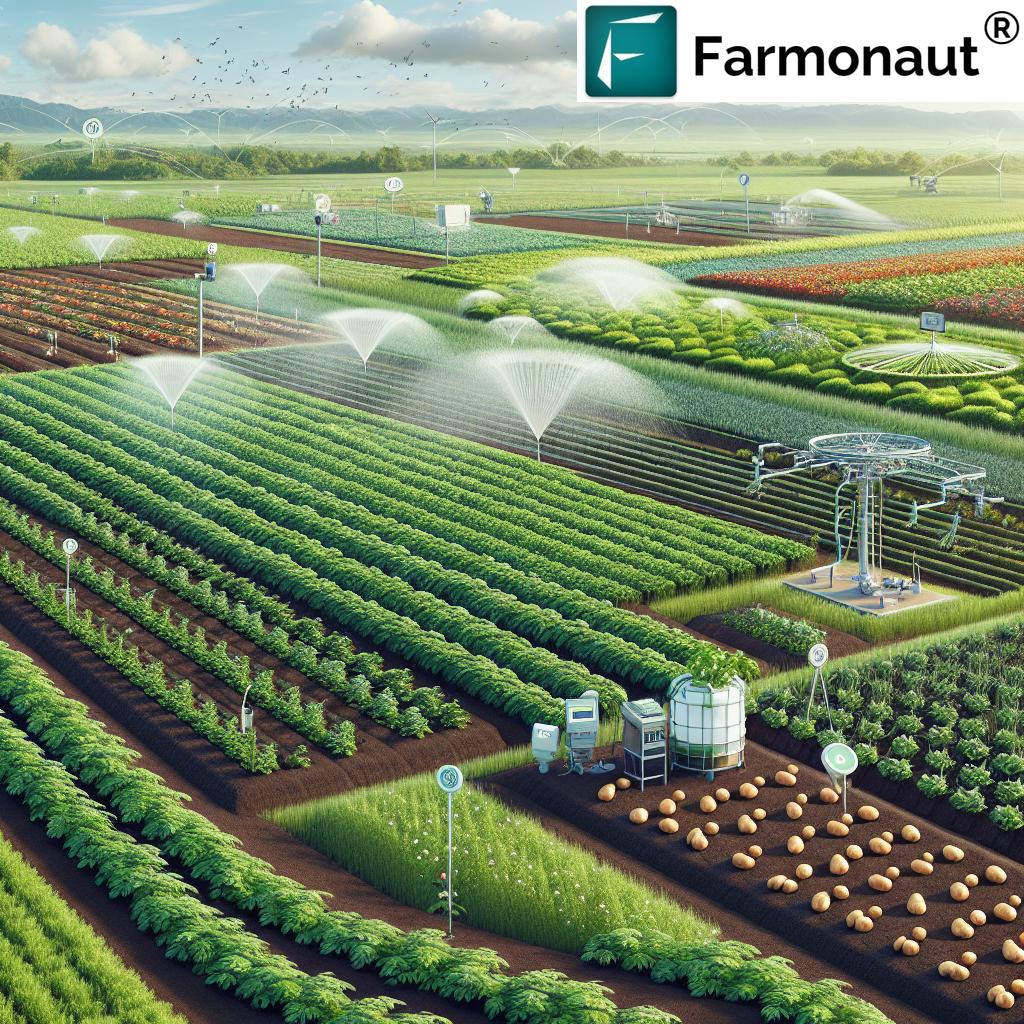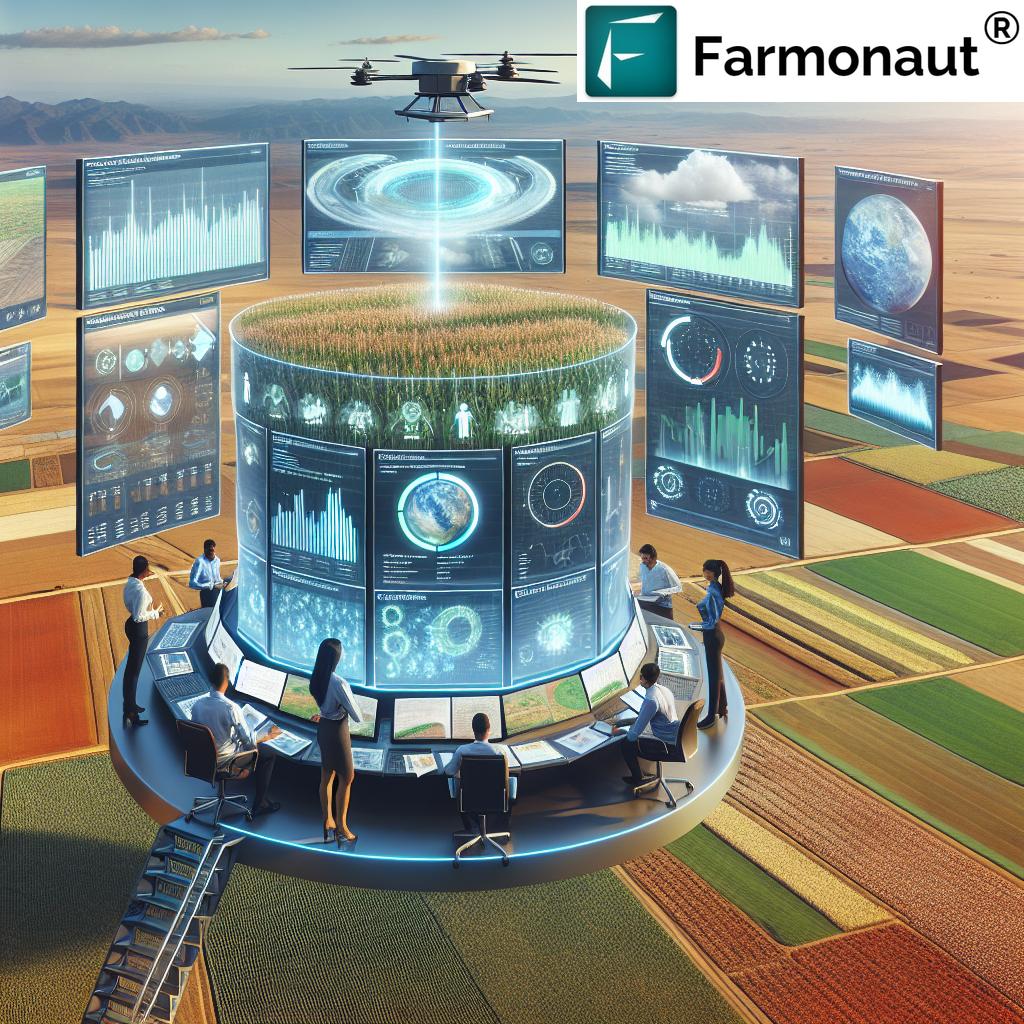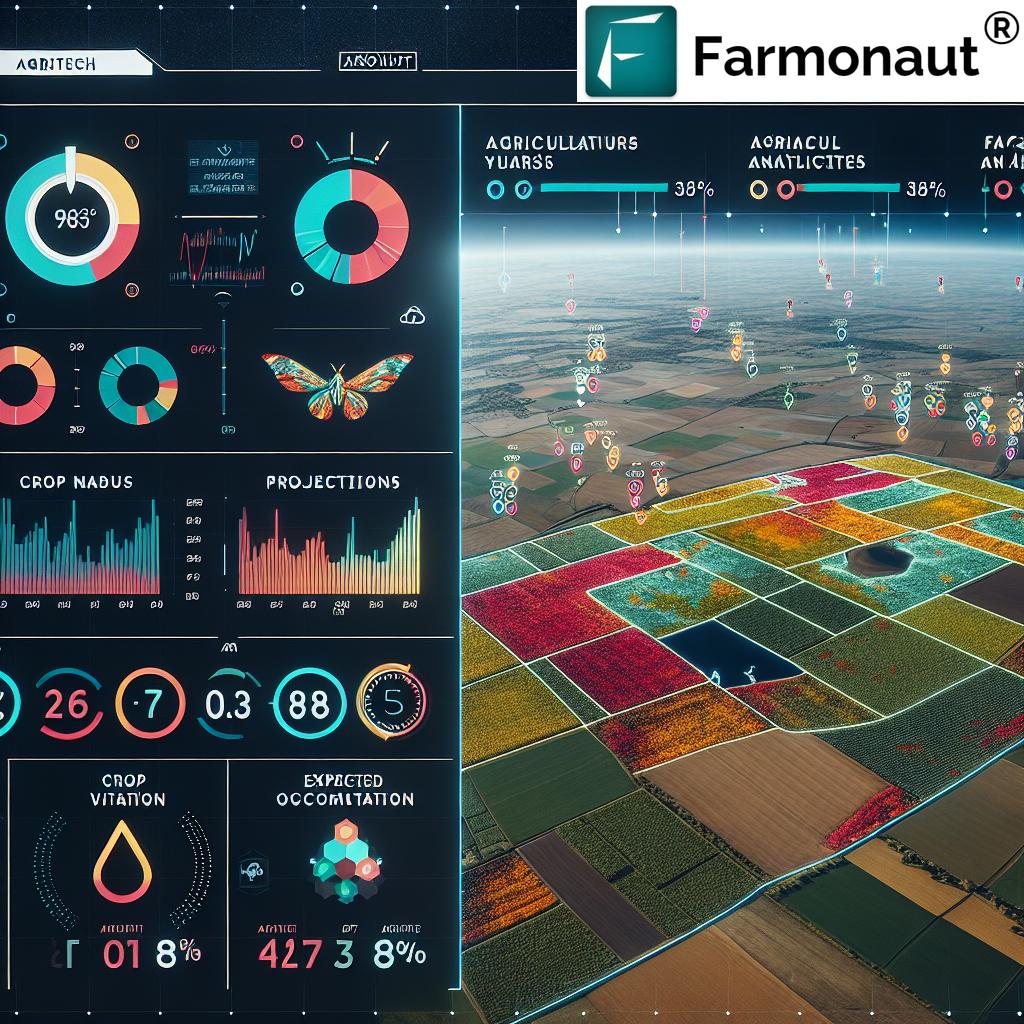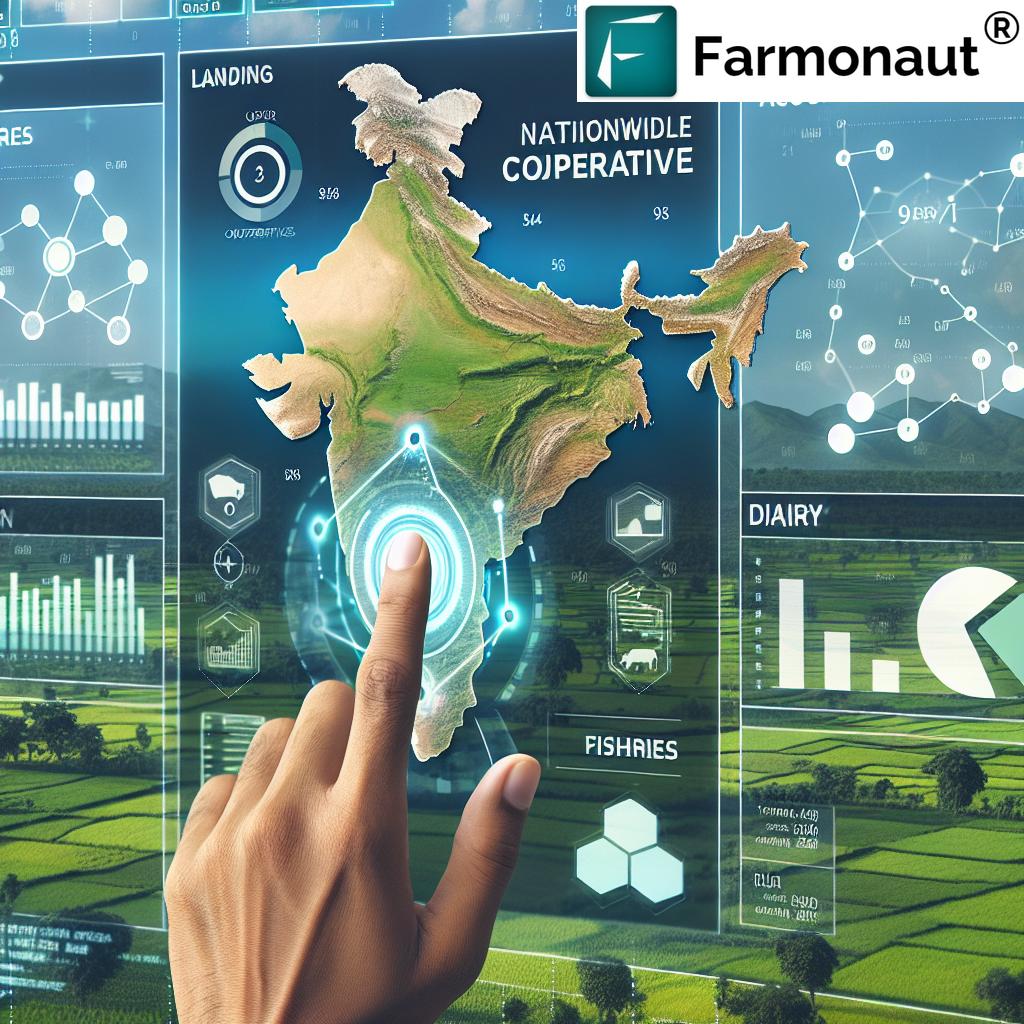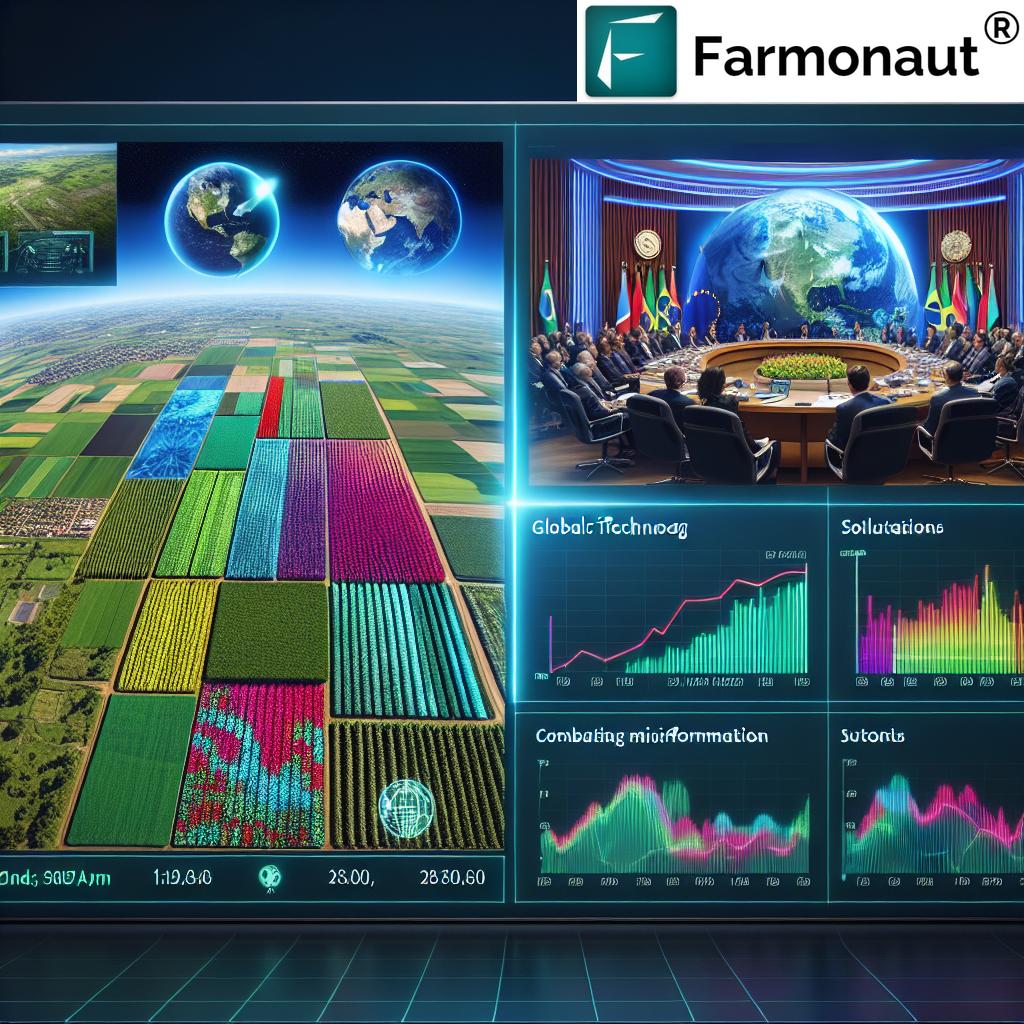Revolutionizing Indian Agriculture: How AI and Sustainable Practices Are Boosting Farmer Income and Soil Health

“AI-powered disease forecasting in agriculture can reduce chemical inputs by up to 30%, promoting sustainable farming practices.”
In the heart of India’s agricultural landscape, a revolution is quietly unfolding. As we delve into the world of sustainable agriculture in India, we’re witnessing a remarkable transformation driven by artificial intelligence (AI) and innovative farming technologies. These advancements are not just reshaping how we cultivate crops; they’re fundamentally altering the economic and environmental fabric of rural India.
At Farmonaut, we’re at the forefront of this agricultural renaissance, leveraging cutting-edge technology to empower farmers across the nation. Our mission is clear: to make precision agriculture accessible and affordable, bridging the gap between traditional farming methods and the digital age.
The Current State of Indian Agriculture
Indian agriculture, the backbone of our nation’s economy, faces critical challenges. From erratic weather patterns to depleting soil health, farmers grapple with numerous obstacles in their quest for sustainable and profitable farming. However, amidst these challenges, a new era of hope is emerging, powered by technology and sustainable practices.
- Soil degradation affects over 147 million hectares in India
- Water scarcity impacts nearly 54% of the country
- Smallholder farmers, who make up 86% of Indian farmers, often struggle with low productivity and income
These statistics paint a picture of an industry in need of innovation. This is where AI in farming and sustainable farming technologies come into play, offering solutions that were once thought impossible.
AI: The Game-Changer in Indian Agriculture
Artificial intelligence is revolutionizing every aspect of farming, from sowing to harvesting. At Farmonaut, we’ve integrated AI into our core offerings, providing farmers with tools that were once the domain of large agribusinesses.
Jeevn AI Advisory System: Our AI-driven farm advisory tool delivers real-time insights, revolutionizing decision-making processes for farmers. By analyzing satellite data and various environmental factors, Jeevn AI offers personalized recommendations for crop management, optimizing yields while minimizing resource usage.
Key Areas Where AI is Making a Difference:
- Precision Farming: AI algorithms analyze satellite imagery to provide insights on crop health, allowing for targeted interventions.
- Weather Prediction: Advanced AI models offer hyper-local weather forecasts, crucial for planning farming activities.
- Pest and Disease Management: AI-powered image recognition systems can identify pests and diseases early, reducing crop losses.
- Soil Health Analysis: AI tools assess soil composition, recommending optimal fertilizer usage and crop rotation strategies.
The integration of AI in agriculture is not just about technology; it’s about empowering farmers with knowledge and tools to make informed decisions. This shift towards data-driven farming is a cornerstone of sustainable agriculture in India.
Sustainable Farming Technologies: A New Hope for Indian Agriculture
Sustainable farming technologies are proving to be a beacon of hope for Indian agriculture. These innovations are not only environmentally friendly but also economically viable, addressing the dual challenges of ecological preservation and farmer prosperity.
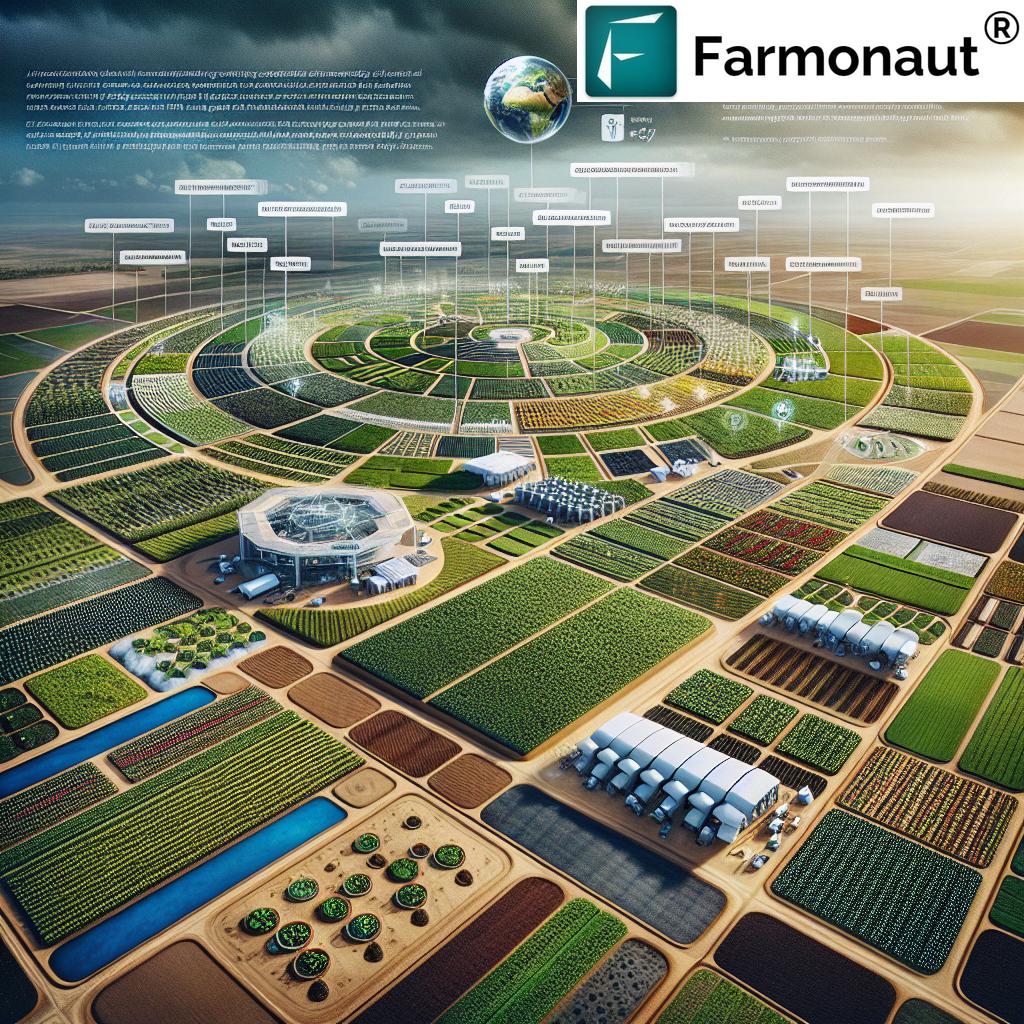
Key Sustainable Farming Technologies:
- Drip Irrigation: Reduces water usage by up to 60% compared to traditional methods.
- Organic Farming Practices: Enhances soil health and produces chemical-free crops.
- Vertical Farming: Maximizes land use efficiency, especially in urban areas.
- Agroforestry: Combines agriculture and forestry for improved biodiversity and soil conservation.
At Farmonaut, we’re integrating these sustainable technologies with our AI-driven solutions. Our satellite-based crop health monitoring system, for instance, supports precision agriculture, enabling farmers to optimize resource use and reduce environmental impact.
Soil Health Preservation: The Foundation of Sustainable Agriculture
Soil health is the cornerstone of sustainable agriculture. In India, where centuries of intensive farming have led to widespread soil degradation, preserving and enhancing soil health is crucial for long-term agricultural sustainability.
Strategies for Soil Health Preservation:
- Crop Rotation: Enhances soil structure and nutrient content.
- Cover Cropping: Prevents soil erosion and improves organic matter content.
- Minimal Tillage: Reduces soil disturbance and preserves soil microorganisms.
- Organic Amendments: Application of compost and manure to enhance soil fertility.
Our satellite-based monitoring at Farmonaut allows farmers to track soil health indicators over time, enabling them to make informed decisions about soil management practices.
“High-value horticulture crops can increase farmer income by 2-3 times compared to traditional crops, boosting agricultural profitability.”
Crop Diversification: A Strategy for Risk Mitigation and Income Enhancement
Crop diversification is a powerful strategy for enhancing agricultural productivity and mitigating risks associated with monoculture. In India, where smallholder farmers are particularly vulnerable to market fluctuations and climate change, diversification offers a path to resilience and increased income.
Benefits of Crop Diversification:
- Reduced vulnerability to pests and diseases
- Improved soil health through varied nutrient demands
- Increased income stability through multiple revenue streams
- Enhanced biodiversity and ecosystem services
At Farmonaut, we provide farmers with data-driven insights to guide their crop diversification strategies. Our AI algorithms analyze market trends, climate data, and soil conditions to recommend optimal crop combinations for each farm.
Explore our API for advanced agricultural insights
High-Value Horticulture: Boosting Farmer Income
High-value horticulture presents a significant opportunity for Indian farmers to increase their income. Fruits, vegetables, and flowers often command higher market prices and can be more profitable than traditional grain crops.
Key Aspects of High-Value Horticulture:
- Market Demand: Growing urban populations and changing dietary preferences drive demand for diverse horticultural products.
- Export Potential: Many Indian horticultural products have strong export markets.
- Value Addition: Opportunities for processing and packaging can further increase income.
- Resource Efficiency: Many horticultural crops require less water and land compared to traditional crops.
Our Farmonaut platform provides real-time market data and crop suitability analysis, helping farmers make informed decisions about transitioning to high-value horticulture.
Weather Prediction: A Crucial Tool for Modern Farming
Accurate weather prediction is becoming increasingly vital in the face of climate change and erratic weather patterns. For Indian farmers, who largely depend on monsoon rains, precise weather forecasts can mean the difference between a bountiful harvest and crop failure.
Impact of Advanced Weather Prediction:
- Optimized planting and harvesting schedules
- Efficient irrigation management
- Improved pest and disease control timing
- Reduced crop losses due to extreme weather events
Farmonaut’s weather prediction tools leverage AI and satellite data to provide hyper-local forecasts, enabling farmers to make timely decisions and adapt to changing weather conditions.
Check out our API Developer Docs for weather data integration
The Role of AI in Weed Management and Disease Forecasting
Artificial Intelligence is revolutionizing weed management and disease forecasting in agriculture, potentially reducing the reliance on chemical inputs and improving overall crop health.
AI in Weed Management:
- Image Recognition: AI-powered cameras can identify weed species in real-time.
- Precision Spraying: Targeted application of herbicides, reducing overall chemical use.
- Robotic Weeding: AI-guided robots for mechanical weed removal in organic farming.
AI in Disease Forecasting:
- Early Detection: AI algorithms analyze satellite and drone imagery to spot early signs of crop diseases.
- Predictive Modeling: AI models forecast disease outbreaks based on weather patterns and historical data.
- Customized Treatment Plans: AI-generated recommendations for disease management tailored to specific crops and regions.
At Farmonaut, we’re integrating these AI capabilities into our platform, providing farmers with advanced tools for weed and disease management that are both effective and environmentally friendly.
Improving Farmer Income: The Ultimate Goal
Improving farmer income is at the heart of our mission at Farmonaut. By integrating AI and sustainable practices, we’re working towards a future where Indian farmers can thrive economically while contributing to global food security.
Strategies for Improving Farmer Income:
- Cost Reduction: AI-driven precision agriculture reduces input costs.
- Yield Optimization: Data-driven decisions lead to higher crop yields.
- Market Access: Digital platforms connect farmers directly to consumers and larger markets.
- Value Addition: Encouraging processing and packaging at the farm level.
- Diversification: Balancing traditional crops with high-value alternatives.
Our blockchain-based traceability solutions also play a crucial role in improving farmer income by ensuring fair prices and building consumer trust in agricultural products.
The Future of Indian Agriculture: A Synthesis of Technology and Tradition
As we look to the future of Indian agriculture, we envision a landscape where cutting-edge technology harmoniously coexists with traditional farming wisdom. This synthesis holds the key to overcoming the dual challenges of food security and environmental sustainability.
Key Elements of Future Indian Agriculture:
- AI-Driven Decision Making: From crop selection to harvesting, AI will guide every step of the farming process.
- IoT in Agriculture: A network of sensors providing real-time data on soil, water, and crop conditions.
- Blockchain for Transparency: Ensuring fair prices and building consumer trust through traceable supply chains.
- Vertical and Urban Farming: Maximizing land use in urban areas to meet growing food demands.
- Genetic Engineering: Developing crop varieties resistant to pests, diseases, and climate extremes.
At Farmonaut, we’re continuously evolving our platform to incorporate these future trends, ensuring that Indian farmers stay at the forefront of agricultural innovation.
Comparative Analysis: Traditional vs. AI-Integrated Sustainable Practices
To truly understand the impact of AI and sustainable practices on Indian agriculture, let’s look at a comparative analysis:
| Agricultural Aspect | Traditional Methods | AI-Integrated Sustainable Practices |
|---|---|---|
| Crop Yield (estimated tons/hectare) | 2-3 | 4-6 |
| Water Usage (estimated liters/hectare) | 10,000-15,000 | 6,000-8,000 |
| Pesticide Use (estimated kg/hectare) | 2-3 | 0.5-1 |
| Soil Health (qualitative assessment) | Degrading | Improving |
| Farmer Income (estimated percentage increase) | Baseline | 30-50% increase |
| Weather Prediction Accuracy (estimated percentage) | 60-70% | 85-95% |
| Disease Detection Rate (estimated percentage) | 50-60% | 80-90% |
| Crop Diversification (estimated number of crops) | 1-2 | 3-5 |
This table clearly illustrates the potential improvements across various agricultural aspects when adopting AI and sustainable practices. The benefits range from increased yields and reduced resource usage to improved soil health and higher farmer incomes.
Conclusion: Embracing a Sustainable, Tech-Driven Future
As we conclude our exploration of the revolutionary changes in Indian agriculture, it’s clear that the fusion of AI and sustainable practices is not just a trend, but a necessary evolution. At Farmonaut, we’re proud to be at the forefront of this transformation, providing farmers with the tools they need to thrive in this new era of agriculture.
The journey towards sustainable agriculture in India is ongoing, but with each technological advancement and each farmer who adopts these practices, we move closer to a future where agriculture is not only productive but also environmentally sustainable and economically viable.
We invite you to join us in this revolution. Whether you’re a farmer looking to adopt precision agriculture techniques, a researcher interested in agricultural data, or an agribusiness seeking to optimize operations, Farmonaut has solutions tailored for you.
FAQs
- Q: How does AI improve crop yields?
A: AI analyzes data from various sources like satellite imagery, weather patterns, and soil sensors to provide precise recommendations for planting, irrigation, and harvesting, leading to optimized crop yields. - Q: Can small farmers afford AI-based farming technologies?
A: Yes, companies like Farmonaut are making AI-based technologies accessible and affordable for small farmers through mobile apps and subscription-based models. - Q: How does sustainable agriculture benefit soil health?
A: Sustainable practices like crop rotation, minimal tillage, and organic farming enhance soil structure, increase organic matter content, and promote beneficial soil microorganisms. - Q: What role does weather prediction play in modern farming?
A: Accurate weather prediction helps farmers plan activities like planting, irrigation, and harvesting more effectively, reducing crop losses and optimizing resource use. - Q: How can farmers transition to high-value horticulture?
A: Farmers can transition by starting with market research, gradually diversifying crops, investing in necessary infrastructure, and leveraging technologies like Farmonaut for crop management and market insights.
Join us in revolutionizing Indian agriculture. Together, we can create a more sustainable, profitable, and resilient farming future.









